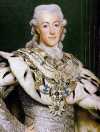 In the spring of 1771, an outbreak of bubonic plague swept through Moscow. Authorities instituted a number of policies in an attempt to contain the epidemic, but the severe measures were unpopular with the general public. Factories and stores were shut down, and the economy was essentially at a standstill. Fearful, and faced with acute food shortages, the people took to the streets in an uprising that would later be known as the Plague Riot. What was done to the bell that mobilized the rioters? Discuss
In the spring of 1771, an outbreak of bubonic plague swept through Moscow. Authorities instituted a number of policies in an attempt to contain the epidemic, but the severe measures were unpopular with the general public. Factories and stores were shut down, and the economy was essentially at a standstill. Fearful, and faced with acute food shortages, the people took to the streets in an uprising that would later be known as the Plague Riot. What was done to the bell that mobilized the rioters? Discuss
Source: The Free Dictionary
 Gustav III was King of Sweden from 1771 to 1792. Having inherited a weakened Swedish throne, he established a new constitution that increased the crown’s power. His numerous enlightened reforms antagonized the nobility, and when a group of Swedish officers mutinied during his unpopular war on Russia, he reinstated absolute monarchy. Gustav planned to form a league of European monarchs to oppose the French Revolution, but Swedish nobles had him assassinated. Where was Gustav when he was shot?
Gustav III was King of Sweden from 1771 to 1792. Having inherited a weakened Swedish throne, he established a new constitution that increased the crown’s power. His numerous enlightened reforms antagonized the nobility, and when a group of Swedish officers mutinied during his unpopular war on Russia, he reinstated absolute monarchy. Gustav planned to form a league of European monarchs to oppose the French Revolution, but Swedish nobles had him assassinated. Where was Gustav when he was shot?  Madagascar Martyrs’ Day memorializes those who died in the
Madagascar Martyrs’ Day memorializes those who died in the  Early in his career, Jünger, a German writer and WWI veteran, published novels based on his army experience. Strongly influenced by German philosopher Friedrich Nietzsche, they glorified war and its sacrifice as the greatest physical and mental stimulants. He later opposed Hitler and rejected his own militarism, expressing instead a desire for peace in his wartime diaries and in futuristic novels like On the Marble Cliffs, an allegorical attack on Nazism. What is Jünger’s best known work?
Early in his career, Jünger, a German writer and WWI veteran, published novels based on his army experience. Strongly influenced by German philosopher Friedrich Nietzsche, they glorified war and its sacrifice as the greatest physical and mental stimulants. He later opposed Hitler and rejected his own militarism, expressing instead a desire for peace in his wartime diaries and in futuristic novels like On the Marble Cliffs, an allegorical attack on Nazism. What is Jünger’s best known work?  The Sumerian civilization was the world’s earliest civilization, developing at the confluence of the Tigris and Euphrates rivers in lower Mesopotamia in about 3500 BCE. The Sumerians had a well-organized communal life and were adept at building canals and irrigation systems. Unfortunately, the evaporation of irrigated waters led to increased soil salinity and greatly reduced agricultural yields, weakening the predominantly agricultural civilization. What form of writing did the Sumerians invent?
The Sumerian civilization was the world’s earliest civilization, developing at the confluence of the Tigris and Euphrates rivers in lower Mesopotamia in about 3500 BCE. The Sumerians had a well-organized communal life and were adept at building canals and irrigation systems. Unfortunately, the evaporation of irrigated waters led to increased soil salinity and greatly reduced agricultural yields, weakening the predominantly agricultural civilization. What form of writing did the Sumerians invent?  The city now known as Istanbul was founded as the Greek colony of Byzantium in the 8th century BCE. Eventually passing to Alexander the Great, it became a free city under the Romans in the 1st century CE. Emperor Constantine I made the city the seat of the Eastern Roman Empire in 330, later naming it Constantinople. It remained the capital of the subsequent Byzantine Empire after the fall of Rome in the late 5th century and then changed hands several times. Why was it renamed Istanbul in 1830?
The city now known as Istanbul was founded as the Greek colony of Byzantium in the 8th century BCE. Eventually passing to Alexander the Great, it became a free city under the Romans in the 1st century CE. Emperor Constantine I made the city the seat of the Eastern Roman Empire in 330, later naming it Constantinople. It remained the capital of the subsequent Byzantine Empire after the fall of Rome in the late 5th century and then changed hands several times. Why was it renamed Istanbul in 1830?